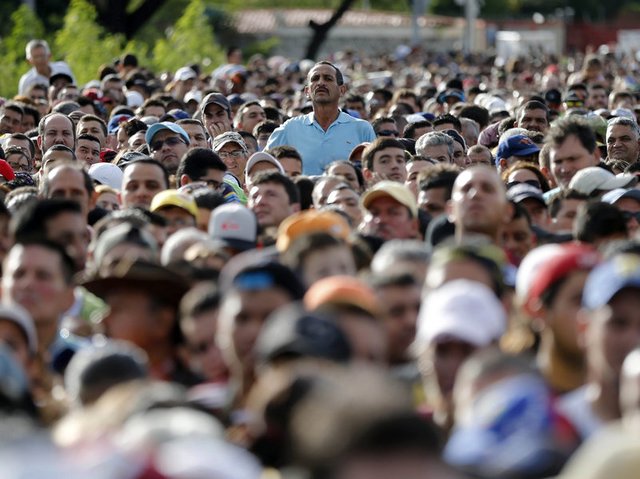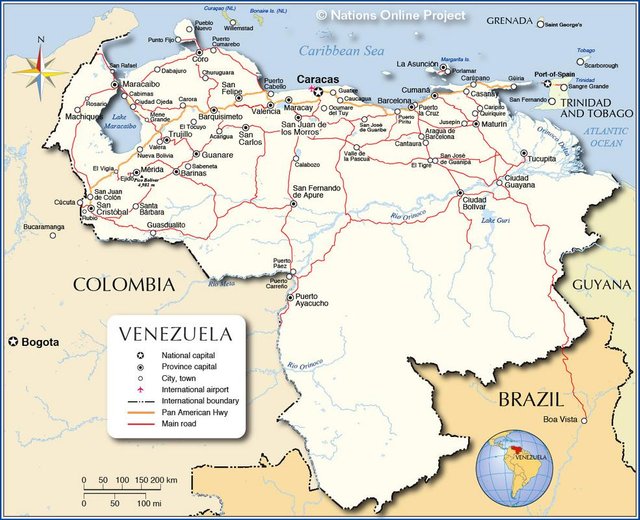How did socialism turn Venezuela into an immigrant factory? Part III: Refugee Crisis (2017-Today)
Gregory Díaz, Venezuelan, crossed the Simón Bolívar international bridge to Colombia in June 2017 with a TV in his shoulder, his only belonging of value. He sold it in Cúcuta and managed to stay a few months with the money he received for the transaction and with the border mobility card, which the Colombian government has issued to 1,300,000 Venezuelans since May 2017, with the intention of regulate the increasing border traffic, which daily is filled on people trying to escape the serious economic and social crisis that the South American country is experiencing.
The increasingly complicated economic crisis pushes Venezuelans to cross the border en masse, a phenomenon that Colombia especially resents.
In the poor neighborhoods of Caracas there is a diaspora motivated by hunger and voracious inflation, the same that years ago was embodied by professionals in search of opportunities, who were frightened by insecurity.
That June was the first attempt to emigrate from Diaz. A young man born and raised in a house with a floor made of dirt and zinc roof at the end of the Bolívar hood of Petare, in Caracas. A boy of 24 years old, father of a child of 5, with incomplete high school, part-time carpenter and without a passport. At the end of February, after saving 10 million Bs., just under 50 dollars and much less than what a TV costs today, he will try again with his girlfriend, who became unemployed in November, when the store where she worked definitely closed.
"Here I do not have a salary, here I'm starving, I want to be able to help my mother, and my sister so that she can study, or in case of bad luck, someone gets sick... For thousands of other things that I suffer here I want to go, because here they spend every day thinking about what to eat, because there is no money or food, "says Díaz. The offer of a job as a barber is his only hope.
"Migrate from Venezuela with nothing in your pocket", El País (source)
This last part of this series is quite moving for me. The main reason for myself writing this is what's happening now in Venezuela. I'll share with you four short videos about how are people with nothing in their pocket migrating to other countries by foot.
What happened?

A crowd waits to cross the border into Colombia over the Simón Bolívar bridge in San Antonio del Táchira, Venezuela (source)
In response to protests over the once-wealthy country's seeming demise, President Nicolás Maduro’s increasingly authoritarian regime has cracked down on opponents, making prospects for improved times less and less likely.
While many exiles had fled to the United States, surging numbers, now they head to other Latin American nations. The change probably stems from President Trump’s tough anti-immigration stance and the fact that fewer Venezuelans can afford the airfare.
From Mexico to Argentina, immigration agencies are reporting skyrocketing numbers of Venezuelan arrivals, doubling and even tripling the total for previous years. (source)
The fact is, economic situation grew worse. Venezuela entered into a hyperinflation cycle, marked at 2,616% at 2017. Poverty rate grew to 82%, a genuine humanitarian crisis. And that was triggered by the Maduro regime:
- The opposition majority of the National Assembly declared on January 9 the abandonment of the office of President Nicolás Maduro, based on article 233 of the Constitution. The MUD, party alliance of the Venezuelan opposition argued that the abandonment of the position should proceed because Maduro was not fulfilling his duties.
- The Constitutional Chamber of the Supreme Court of Justice gave the final thrust to the Parliament in March when it published on March 29 rulings 155 and 156, which not only fulfilled the parliamentary immunity, in practice they dissolved the National assembly Legislative Power.
- Luisa Ortega Díaz, Attorney General, surprised the country on March 31 by denouncing the breakdown of the constitutional order perpetrated by the Supreme Court of Justice when assuming Parliament's powers. That criticism ended up costing her and the exile of both her and her partner, the Chavez follower deputy Germán Ferrer, who fled the country.
- The brutal repression deployed by the government against protesters during the protests that took place between April and July of this year resulted in more than 130 deaths and several injured and detained.
- Query without destination. Declared in civil disobedience, the Venezuelan opposition held a referendum on July 16 that sought to reject the installation of the National Constituent Assembly (ANC) convened by Maduro, demand the Armed Forces to support the Parliament and lay the foundations of a government of National unity.
- The election of the ANC, on July 30. The National Electoral Council announced that more than 8 million Venezuelans participated in these elections. Antonio Mujica, director of Smartmatic -corporation in charge of automated voting-, said: "We cannot guarantee the results of the elections. We believe that the data for the election was manipulated. "
- President Donald Trump imposed financial sanctions on the Venezuelan government on August 25, which prohibited transactions with debt securities and shares issued by the government and its state oil company (PDVSA). It also prohibits transactions with certain existing bonds belonging to the Venezuelan public sector, as well as dividend payments to the Venezuelan government.
- Chavismo won the regional elections on October 15. The United Socialist Party of Venezuela (PSUV) conquered 17 states by popular vote. Then, Juan Pablo Guanipa was dismissed for not being sworn in before the ANC and, when the election for the post was repeated, the pro-government candidate Omar Prieto was elected. In this way, the opposition was with Mérida, Táchira, Anzoátegui and Nueva Esparta, all reached by Acción Democrática party.
- Tarek William Saab, appointed Attorney General of the Republic, announced on November 30 the arrests of former Oil Minister Eulogio del Pino and former President of Petróleos de Venezuela Nelson Martínez, in an anti-corruption operation unprecedented in the history of the country. Behind Del Pino and Martínez fell Diego Salazar, cousin of Rafael Ramírez, former ambassador of Venezuela to the United Nations. In total, the Public Ministry has arrested 65 PDVSA managers so far this year.
- The year 2017 closes as 2016: on the expectation of what may happen with the negotiation of the government and the opposition. The last meeting of 2017 was held in the Dominican Republic on December 15 and concluded with the promise that the parties will meet again between January 11 and 12 to present concrete results. (source)
- In January 2018 Oscar Perez, a Venezuelan police pilot accused of stealing a helicopter and using it to attack the country's Supreme Court in June 2017, was killed in Caracas in an irregular procedure by regime armed forces. (source)
- In February 2018, the opposition parties rejected a draft agreement reached during bilateral meetings in Dominican Republic. The months-long talks broke down after failure to reach a deal on how to organize fair presidential elections in Venezuela. (source)
- Instead the Electoral council set a date for presidential elections on April 22nd.
How is this refugee crisis happening?
In an effort to educate how people are fleeing out from Venezuela, i'll show you the map of my country:

So, Venezuela is at the very north of South America, and it shares their border with Colombia, Guyana and Brazil.
I'll share with you 4 videos, of what's happening:
Venezuela - Colombia border
<iframe width="560" height="315" src="
So, this people want to walk from Colombia to Argentina. Just check how many miles are from there to Colón, Argentina
Next video is about refugees in a basketball court in Cucuta, Colombia:
<iframe width="560" height="315" src="
No comments on this one.
Venezuela - Guyana
<iframe width="560" height="315" src="
How a country so poor as Guyana can offer humanitarian aid to Venezuelans?
Venezuela - Brazil
<iframe width="560" height="315" src="
Closing Remarks
The videos speak from themselves. Socialism is the cause of the downfall of Venezuela. And it was well planned. I'll quote Jorge Giordani again:
I´ll explain: This revolution aims to make a cultural change in the country, to change people's way of thinking and living, and those changes can only be made from power. So, the first thing is to stay in power to make changes. The political floor is given to us by poor people: they are the ones who vote for us, that is why the discourse of the defense of the poor. So, THE POOR MUST CONTINUE BEING POOR, WE NEED THEM SO, until we can make the cultural transformation. Then we can talk about economy of generation and distribution of wealth. In the meantime, you must keep them poor and hopeful."
I pray that we can stop this "cultural transformation" from happening. I send this message to our Steemit community, to share this series of posts on your current social media, in order to make the World aware of what's really happening. We can prevent mass immigration and the problems that come with it only if we gain peace and prosperity in those countries, and socialist agendas are against that.
It is our duty to spread the truth. If you agree, i invite you to resteem the post. Let's prevent the Americas for what could happen if we don't take a stand against socialism in all the hemisphere.
it is going to be much better for you when gangsters get your oil . dumb ass
Curated for #informationwar (by @openparadigm)
Relevance:Equality by making everyone suffer